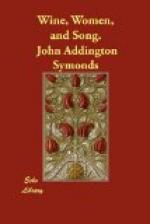I have treated Golias as the eponymous hero of this tribe, the chief of this confraternity. But it ought to be said that the name Golias occurs principally in English MSS., where the Goliardic poems are ascribed to Golias Episcopus. Elsewhere the same personage is spoken of as Primas, which is a title of dignity applying to a prelate with jurisdiction superior even to that of an archbishop. Grimm[40] quotes this phrase from a German chronicle: Primas vagus multos versus edidit magistrates. In the Sequentia falsi evangelii[41] we find twice repeated Primas autem qui dicitur vilissimus. The Venetian codex from which Grimm drew some of his texts[42] attributes the Dispute of Thetis and Lyaeus and the Advice against Matrimony, both of which passed in England under the name of Golias and afterwards of Walter Map, to Primas Presbyter.
With regard to this Primas, it is important to mention that Fra Salimbene in his Chronicle[43] gives a succinct account of him under the date 1233. It runs as follows: Fuit his temporibus Primas canonicus eoloniensis, magnus trutannus et magnus trufator, et maximus versificator et velox, qui, si dedisset cor suum ad diligendum Deum, magnus in litteratura divina fuisset, et utilis valde Ecclesiae Dei. Cujus Apocalypsim, quam fecerat, vidi, et alia scripta plura. After this passage follow some anecdotes, with quotations of verses extemporised by Primas, and lastly the whole of the Confession, translated by me at p. 55 above. Thus Salimbene, who was almost a contemporary author, attributes to Primas two of the most important poems which passed in England under the name of Golias, while the Venetian MS. ascribes two others of the same class to Primas Presbyter. It is also very noteworthy that Salimbene expressly calls this Primas a Canon of Cologne.
That this poet, whoever he was, had attained to celebrity in Italy (as well as in Germany) under the title of Primas, appears also from the following passage of a treatise by Thomas of Capua[44] on the Art of Writing: Dictaminum vero tria sunt genera auctoribus diffinita, prosaicum scilicet, metricum et rithmicum; prosaicum ut Cassiodori, metricum ut Virgilii, rithmicum ut Primatis. Boccaccio was in all probability referring to the same Primas in the tale he told about Primasso,[45] who is described as a man of European reputation, and a great and rapid versifier. It is curious that just as Giraldus seems to have accepted Golias as the real name of this poet,[46] so Fra Salimbene, Thomas of Capua, and Boccaccio appear to use Primas as a Christian name.
The matter becomes still more complicated when we find, as we do, some of the same poems attributed in France to Walter of Lille, in England to Walter Map, and further current under yet another title of dignity, that of Archipoeta.[47]




